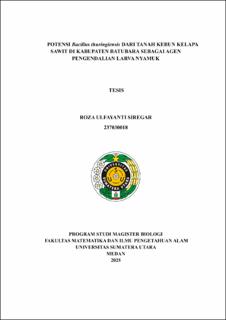| dc.description.abstract | The increasing resistance of Aedes aegypti and Culex sp. mosquitoes to chemical insecticides necessitates the search for environmentally friendly alternatives. This study evaluated the toxicological potential of Bacillus thuringiensis (Bt) isolated from the soil of oil palm plantations in Batubara Regency, North Sumatra, which is a local isolate. Mortality of Ae.aegypti and Culex sp. larvae was evaluated by the occurrence of larval midgut damage after exposure to the Bt isolate. The test was carried out using instar III and IV larvae by administering a suspension of Bt liquid culture from three different localities coded BTKS 01, BTKS 05, and BTKS 07. The percentage of mortality was observed for 24, 48, 72, and 96 hours. Additionally, pathological examinations of larval midgut tissues were conducted to assess internal damage. Results showed that some isolates caused high mortality (>70%) and serious damage to the intestinal epithelium. The results of this study indicate that Bt local to oil palm plantations in Batubara District has high effectiveness against mosquito larvae and has potential as an environmentally friendly bioinsecticide. These findings support the use of local Bt as a biological control agent to reduce chemical insecticide use and its negative environmental impact, contamination and resistance development in mosquito vectors. | en_US |


